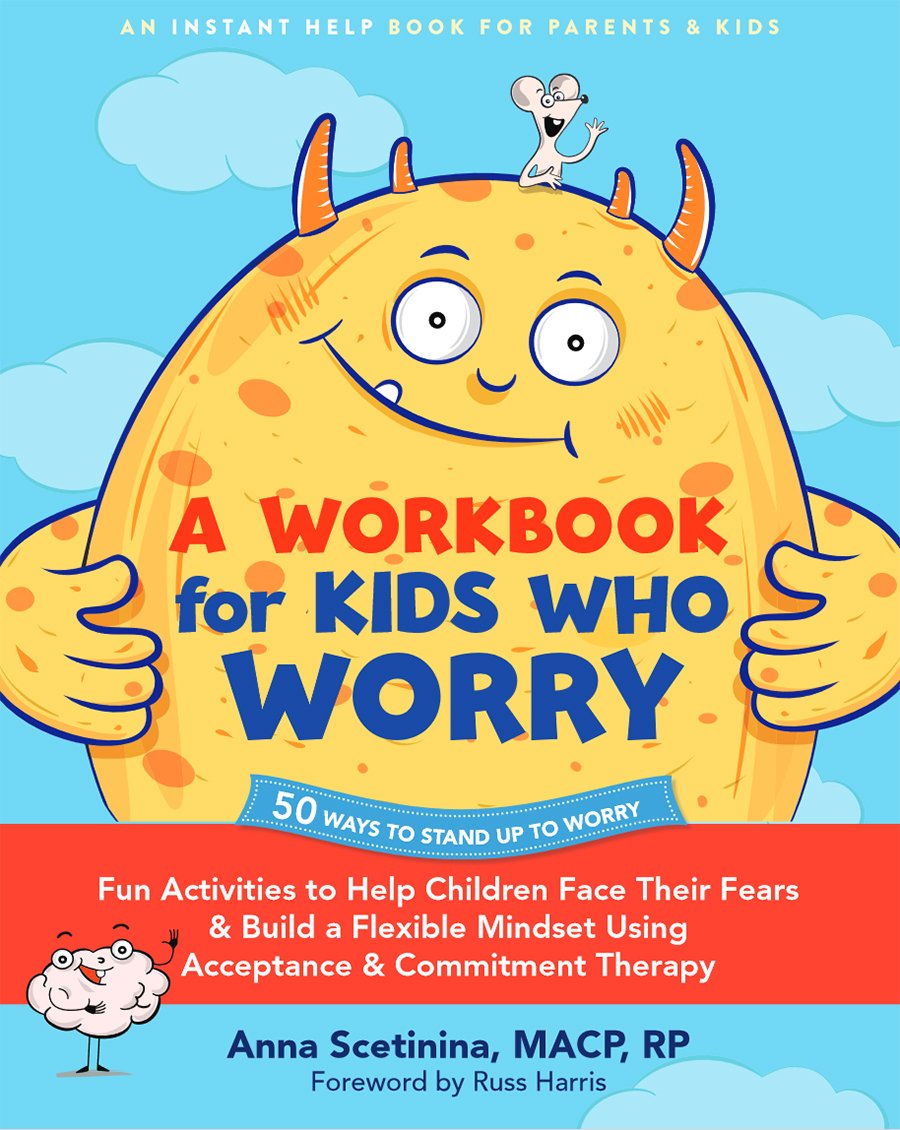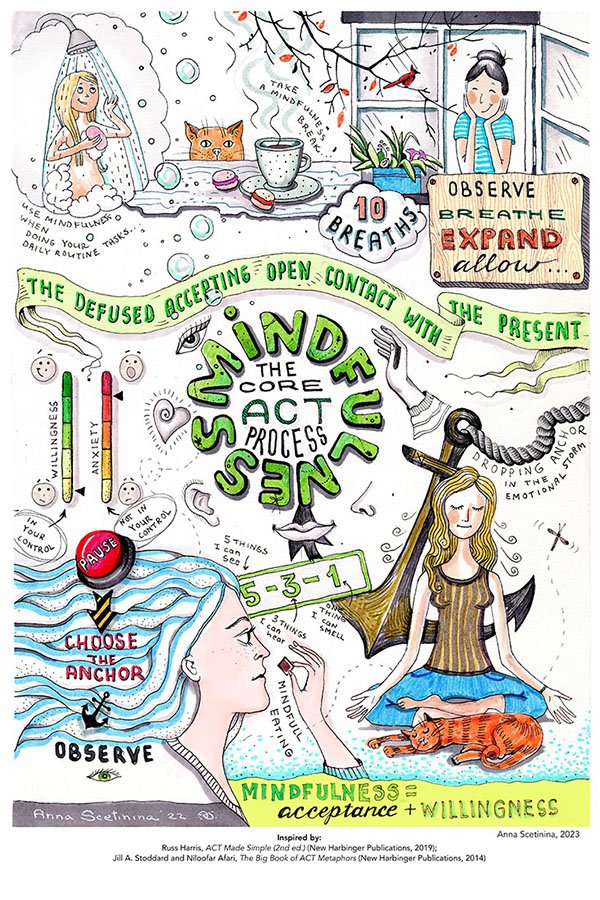Anna Scetinina, MA, MACP, RP
Hi, I am Anna, a registered psychotherapist and the author of A Workbook for Kids Who Worry.
I provide individual therapy helping children, teens, adolescents, and adults deal with OCD, anxiety disorders (social phobia, agoraphobia, paruresis - “shy bladder” syndrome, specific phobias, GAD, panic disorder), panic attacks, depression, emetophobia, body dysmorphic disorder (BDD), body-focused repetitive behaviour (BFRB), including trichotillomania (hair-pulling) and excoriation (skin-picking), tic disorder (TS, motor and vocal tics), stress, misophonia, perfectionism, and low self-esteem. I also provide support for addressing parental concerns.
Therapeutic Approach
Therapeutic modalities that I use with my clients include ACT (Acceptance and Commitment Therapy), CBT (Cognitive Behavioral Therapy), ERP (Exposure and Response Prevention), I-CBT (Inference-based Cognitive Behavioral Therapy), Solution-Focused Therapy, and mindfulness-based interventions.
We will collaboratively decide what approach would be the best for you, based on the concerns you want to work on.
Obsessive-Compulsive Disorder (OCD)
Our clinic specializes in treating obsessive-compulsive disorder (OCD). I see clients who have different subtypes of OCD, including the following:
Contamination obsessions. Fear of germs and/or chemicals, magical contamination OCD.
Morphing OCD. Fear of getting somebody else’s undesired features, personal qualities, or personality traits.
Harm OCD. Intrusive thoughts and/or disturbing images about harming oneself (suicidal OCD) or others, or fear of something terrible happening to oneself or loved ones.
Hit-and-run OCD. Fear of accidentally harming/hitting a pedestrian without noticing while driving, crossing an intersection, going over a bump on the road, or leaving a parking lot.
Insult OCD. Fear of saying/blurting out/writing the wrong things, including something inappropriate, insulting, or offensive.
Sexual orientation OCD (SO-OCD, HOCD). Intrusive thoughts and doubts about sexual orientation.
Moral scrupulosity obsessions. Preoccupation with right or wrong, anxiety about being a good
person/bad person, rigid rule-following, excessive worries about others breaking rules.
Existential OCD. Existential obsessions about life, including obsessively questioning reality and one’s life purpose.
Religious obsessions. Worries about possibly acting sinfully and/or being a blasphemer, or being not religious enough.
Just-right OCD. Urges to do things in a specific way, such as arranging objects until they feel right, touching things in a certain way until it feels right, and experiencing anxiety about things feeling incomplete.
POCD. Fear of being or becoming a pedophile, disturbing, intrusive thoughts, and images involving children.
Relationship OCD (ROCD). doubts about relationships, doubts about attraction to the partner or partner’s attraction, doubts about whether being in the right relationship, and whether to stay or end the relationship.
Real event or real-life OCD. Intrusive thoughts about past events (fear that something bad, immoral, or inappropriate was done/happened) that cause intense fear and guilt.
False memory OCD. Intrusive thoughts about events that could have taken place, and feeling unsure whether a specific memory is accurate.
Hoarding and digital hoarding. Difficulty letting go of possessions because of a perceived need to keep them when they have no sentimental value, need to save digital content/files and keep them in order.
Memory hoarding OCD. Obsessive need to ensure things are remembered.
Magical thinking. Believing that having a thought/memory/feeling can cause actual events to happen and needing to prevent that by doing mental or physical rituals.
OCD about OCD/Meta-OCD – doubting whether you have OCD, fear of maybe having a different mental health illness, fear of never knowing for sure your condition, fear of possibly being in the wrong treatment, questioning your recovery/therapist/approach/response to obsessions.
All other “pure-O” OCD presentations. Disturbing, intrusive thoughts and images of a different nature without the presence of physical rituals/compulsions.
Health OCD. Preoccupation with one’s health and living a healthy life, fear of having or developing a serious illness, such as cancer, ALS, or another serious condition.
All other unique OCD presentations, such as TOCD (Tourettic OCD), staring OCD, sensorimotor OCD (hyperawareness of bodily functions, sensations, smells, sounds), disgust OCD, OCD about bodily fluids and excretions, sticky substances.
If you have any of these types of obsessions, you probably engage in some of these compulsions:
- Physical compulsions (cleaning, checking, knocking, touching, confessing, apologizing,
searching/googling, arranging, testing, repeating, seeking reassurance);
- Mental compulsions (counting, self-reassuring, reviewing, comparing, self-criticizing, playing
scenarios in your head, ruminating, neutralizing, thinking positive thoughts, checking if thoughts are there, engaging in compulsive reasoning);
- Avoidance (avoiding triggering places, objects, words, thoughts, memories, people).
If you are dealing with these obsessions and compulsions, I can help you understand how OCD
works and what things you presently do that keep your OCD going. We can plan together what
changes to make to reduce your ineffective responses and help you build a life you want, where
you (not your OCD!) are in charge. As part of the treatment process, we will work on reducing
family accommodations and increasing family support.
I offer two evidence-based treatment options for addressing your OCD:
1) A combination of ACT and Exposure Therapy (ERP)
2) I-CBT approach, which is a gentler and more compassionate alternative to exposure therapy
for the treatment of OCD
Emetophobia
Emetophobia is an intense fear throwing up or others throwing up. This fear often causes a
sufferer a lot of shame, makes them avoid doing things, eating specific food (or restrict/limit
eating), and going places, and makes them put all their efforts into trying to prevent the fear from
coming true. They also have a lot of difficulty tolerating the uncertainty of everyday life.
Together, we can work on helping you free yourself from emetophobia, build a life worth living,
and start doing things you have been avoiding due to your fear.
Illness anxiety/hypochondria
Having health concerns is normal, but when you have illness anxiety, you may be preoccupied
with and having an intense fear of developing a serious illness or having an undetected serious
illness, and this fear takes a lot of your time, pulls you out of being present, and can significantly
impact your life. If you frequently check your physical symptoms, google or avoid googling, call
doctors, or avoid calling doctors, seek reassurance, I can help you learn to respond to your
thoughts, sensations, and feelings more flexibly. Together, we will work on breaking the cycle of
anxiety and helping you learn to live with uncertainty while fully engaging in your life.
Perfectionism
If your desire for achievement and delivering great work has turned into a rigid rule and your mind demands that you do things perfectly, you might be dealing with unhelpful perfectionism.
It can show up in excessive time spent studying, checking, and reviewing material, and yet no matter how much time you spend, you feel your work is ‘never good enough.’ I work with students devastated when they don’t get a 100 on a test and with professionals who sacrifice their family life and self-care for endless attempts to perfect their work reports. If this sounds familiar, we can explore your fear and help you learn to let go of doing things that limit and drain your life and let your values guide your actions.
Depression
Loss of interest in life and in doing activities that you found enjoyable in the past, persistent sadness, irritability, change in appetite or sleep schedule, lack of energy, guilt, suicidal thoughts, and ideations - these are things that you might experience when you are depressed. We can work together on helping you find motivation in life, explore your values, reduce doing things that keep your mood low, and increase behaviors that enrich your life to overcome depression.
Misophonia
People with misophonia are emotionally impacted by common sounds, such as people breathing, chewing, yawning, tapping, or making repetitive noises. If these or other sounds make you feel fearful, disgusted, angry, or panicky and give you intense anticipatory anxiety before social events or make you avoid triggering situations, you probably are struggling with misophonia. In therapy, you learn to use your attention flexibly, expanding your focus and shifting it where you choose to while learning to tolerate distressing sounds better and reduce their impact on your life.
Working with children and teens
Many of my clients are children and teens ages 9 to 17. They come with various concerns, including perfectionism, phobia, social anxiety, OCD, behavioral issues, and emotional regulation issues. Sometimes, e-therapy with a child is challenging; in such cases, I provide parental training to help parents respond to their child’s behavior more effectively. I incorporate engaging exercises, art, and visuals into my therapy work when working with younger clients. Coordinating and planning support for the child or teen with parents is essential for success in recovery. At the first session, we plan how to provide updates, discuss concerns, and progress in maintaining the child’s confidentiality and respecting the parent’s right to information.
Parental Training
If you need support in dealing with parental stress and your children’s challenging behaviours, we can collaboratively identify your goals and needs and work on making changes in your behaviour and your responses to triggering situations to impact your children’s behaviours positively. I also work with parents of children and teens to help them specifically address their children’s anxiety, fears, and OCD using a specialized approach called SPACE (Supportive Parenting for Anxious Childhood Emotions).
I am the author of A Workbook for Kids Who Worry, published by the New Harbinger Publications in 2025. Fun and evidence-based acceptance and commitment therapy (ACT) skills to help kids face their fears and live joyfully. Written for children ages 5 to 12, this fun and engaging workbook is based on proven-effective acceptance and commitment therapy (ACT) to help kids understand their worries, recognize their thoughts and feelings, and discover what they can and cannot control. Packed with friendly illustrations and exercises, kids can embark on a playful adventure of self-discovery. They will also learn to deal with unpleasant thoughts, work through difficult emotions, and develop a flexible mindset.
























